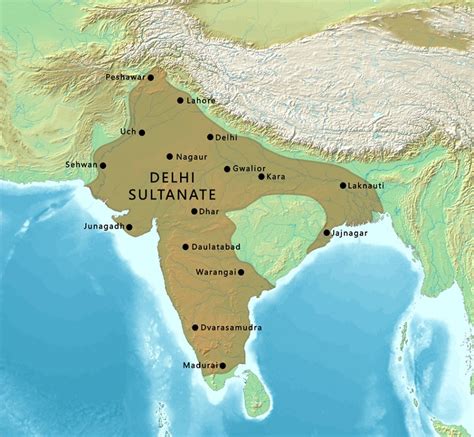Introduction

The Delhi Sultanate, a pivotal era in South Asian history, lasted from 1206 to 1526 CE. Established by the Turkic Mamluk dynasty, it marked a period of significant political, social, and cultural transformations that shaped the region for centuries to come.
Conquest and Expansion
In 1193 CE, Muhammad of Ghor led an army from Ghazni, Afghanistan, into northern India and defeated the last Hindu ruler of Delhi, Prithviraj Chauhan. This victory marked the beginning of the Delhi Sultanate. Over the next few decades, the Mamluk sultans expanded their territory southward, conquering vast swathes of land in northern India.
By the reign of Alauddin Khalji (1296-1316 CE), the Delhi Sultanate reached its zenith. Khalji expanded the empire into South India, conquering the Deccan Plateau and establishing outposts as far south as Madurai. Under his rule, the sultanate became one of the most powerful and prosperous states in the Islamic world.
Consolidation and Governance
The Delhi Sultanate adopted an efficient administrative system to govern its vast territory. Sultans established a centralized bureaucracy, with ministers and officials appointed to manage various aspects of governance. The sultanate also introduced a land revenue system that provided a steady stream of income.
To maintain order and stability, the sultans employed a powerful military force, consisting of cavalry, infantry, and war elephants. They also built fortifications and fortresses to defend their territories.
Key Institutions and Innovations
The Delhi Sultanate established several key institutions and innovations that had a lasting impact on Indian society:
- Education: The sultans patronized learning and education, establishing numerous madrasas and libraries.
- Trade: The sultanate fostered a flourishing trade network, with merchants from India, Central Asia, and the Middle East trading in a wide variety of goods.
- Architecture: The sultanate is known for its impressive architectural legacy, including iconic monuments such as the Qutb Minar and the Tughlaqabad Fort.
- Literature: The period saw the development of new literary forms, such as Urdu and Hindi, which were influenced by Persian and Arabic literature.
Challenges and Decline
Despite its early success, the Delhi Sultanate faced numerous challenges. Mongol invasions from Central Asia weakened the empire, and internal conflicts and rebellions chipped away at its stability.
In 1398 CE, Timur, a Mongol conqueror, invaded India and sacked Delhi. The sultanate never fully recovered from this blow, and it gradually declined in power. In 1526 CE, the Afghan general Babur invaded India and established the Mughal Empire, marking the end of the Delhi Sultanate.
Legacy and Impact
The Delhi Sultanate left an indelible mark on South Asian history. Its conquests, administrative innovations, and cultural contributions shaped the region for centuries.
Conquest and Expansion
The Delhi Sultanate’s military campaigns expanded the boundaries of Islamic rule in India, bringing millions of Hindus under Muslim control. This had a profound impact on the religious and cultural landscape of the subcontinent.
Administrative System
The sultanate’s centralized administrative system provided stability and efficiency to governance. Its institutions and practices were later adopted by subsequent rulers, including the Mughals.
Cultural Exchange
The Delhi Sultanate facilitated cultural exchange between India and the Islamic world. Persian became the court language, and Islamic art and architecture flourished in India.
Economic Transformations
The sultanate’s trade networks stimulated economic growth and introduced new commodities and technologies to India. This laid the foundation for the region’s future economic development.
Conclusion
The Delhi Sultanate was a transformative period in Indian history. Its conquests, innovations, and cultural contributions left a lasting legacy that continues to shape the region today. From its military prowess to its administrative efficiency and cultural achievements, the sultanate played a pivotal role in the development of South Asia.
